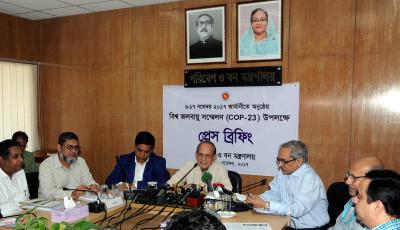DHAKA, Nov 2, 2017 (BSS) – Bangladesh will raise its voice at the Conference of the Parties (COP-23) to mount pressure on the global communities to make them extend financial and technical supports to the developing countries for coping with the negative impacts of global climate change.
“Like in the previous years, we will project adverse impacts caused by global climate change at the COP-23 to mobilize resources so that Bangladesh can overcome its challenges,” Environment and Forest Minister Anwar Hossain Manju told a press conference at his ministry here.
Deputy Minister for Environment and Forests Abdullah Al Islam Jakob, Environment and Forest Secretary Istiaq Ahmed and officials concerned were present, among others, at the press conference.
Manju said various milestone initiatives have been taken in the country, including making Bangladesh Climate Change Strategy and Action Plan (BCCSAP), 2009, Bangladesh Climate Change Resilience Fund (BCCRF) and Climate Change Trust Fund (CCTF) and Climate Change Trust Act-2010, to enhance capacity on the climate change issue.
He said the Paris accord requires all countries to devise plans to achieve the goal of keeping the rise in temperature within two degrees celsius above the pre-industrial levels and strive for 1.5 C if possible.
The Least Developed Countries (LDCs) must be united by developing strong leadership to pile up pressure on the industrialized nations to take actions to stem the planet’s rising temperature, he added.
Manju said, “Paris agreement should be legally binding… One powerful country that has withdrawn its name from the campaign to fight global change is largely responsible for carbon emission. Leading carbon emitting countries must follow international agreements to save the planet from the adverse impact of climate change.”
Bangladesh alone cannot tackle the climate change issue as it is a global phenomenon, Manju said adding it should move bilaterally as well as multilaterally with strong bargaining capacity to exert pressure on the rich nations to make them extend financial and technical supports to the climate vulnerable countries.
Despite negative attitude of the developed countries on the global climate change issue, he said, it is urgent for the vulnerable countries, including Bangladesh, to participate in such global conferences to pile up pressure on them.
Jakob said Bangladesh is already witnessing negative impacts of global climate change and this year’s April was the most rainfall month in the past 45 years. If the current trend of sea level rising continues, millions of people in the southern parts of the country will be displaced, he added.
COP-23 is scheduled to be held in Bonn, Germany from November 6 to 17, this year.
Other officials said countries responsible for global carbon emissions should provide sufficient financial and technical supports to the Least Developed Countries (LDCs), including Bangladesh, to tackle the adverse impacts of climate change.
Despite having little contribution to global carbon emission, LDCs, including Bangladesh, are bearing the burden of excessive carbon emission caused by the industrialised nations, which are mainly responsible for global warming, a great challenge for the planet, they added.



